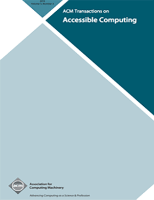
ACM Transactions on Accessible Computing
Scope & Guideline
Enhancing usability for all users.
Introduction
Aims and Scopes
- User-Centric Design for Accessibility:
Research that emphasizes designing technology and interfaces specifically for users with disabilities, ensuring that their unique needs are met through participatory design and user feedback. - Assistive Technologies and Tools:
Development and evaluation of assistive technologies, such as screen readers, tactile devices, and mobile applications, aimed at enhancing the capabilities and independence of users with various disabilities. - Inclusive Interaction Techniques:
Exploration of novel interaction methods that accommodate diverse user needs, including gesture-based controls, voice recognition, and augmented reality applications. - Empirical Studies on Accessibility:
Conducting empirical research to assess the effectiveness of existing technologies and identify barriers faced by users with disabilities, providing evidence-based recommendations for improvements. - Community Engagement and Social Inclusion:
Investigating how technology can foster social connections and community engagement among individuals with disabilities, particularly through social media and online platforms.
Trending and Emerging
- Health and Wellbeing Technologies:
There is a growing focus on technologies that enhance health and wellbeing for individuals with disabilities, such as stress detection using physiological data and self-tracking applications for medical management. - Machine Learning and AI in Accessibility:
The application of machine learning and AI to improve assistive technologies, including automatic speech recognition and sign language processing, is gaining prominence, indicating a shift towards more intelligent, adaptive solutions. - Social Media and Digital Communities:
Research is increasingly addressing the role of social networking sites and online communities in promoting social inclusion for people with disabilities, highlighting their impact on social interactions and support networks. - Augmented and Virtual Reality Applications:
The exploration of AR and VR technologies for training and rehabilitation purposes is emerging as a significant area of interest, showcasing their potential to create immersive experiences for users with disabilities. - Data Visualization for Accessibility:
There is an increasing emphasis on creating accessible data visualizations, particularly for users with visual impairments, indicating a trend towards making complex information more understandable and usable.
Declining or Waning
- General Accessibility Guidelines:
The specific development of universal accessibility guidelines has decreased, possibly due to a shift towards more tailored solutions for specific disabilities rather than broad, generalized approaches. - Traditional Assistive Devices:
Research on traditional assistive devices, such as simple mobility aids, has seen a decline as the focus shifts towards digital and technology-driven solutions that offer more dynamic support. - Static Accessibility Assessments:
The emphasis on static assessments of web or software accessibility has waned, reflecting a trend towards more dynamic, user-centered evaluations that consider real-world usability and user experience. - Hardware-Focused Accessibility Solutions:
Research centered specifically on hardware solutions (e.g., specialized keyboards or mice) has diminished in favor of software and application-based solutions that integrate accessibility features.
Similar Journals
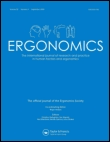
ERGONOMICS
Enhancing health and safety through research.ERGONOMICS is a premier journal that serves the dynamic fields of Human Factors and Ergonomics, as well as Physical Therapy, Sports Therapy, and Rehabilitation. Published by Taylor & Francis Ltd in the United Kingdom, this journal not only boasts a commendable impact factor but also holds a Q2 quartile ranking across its categories, underscoring its influence and academic rigor. With a convergence of significant research dating back to 1957, ERGONOMICS provides a multifaceted platform for the dissemination and discussion of innovative findings that enhance the interaction between people and their environments. Although the journal does not offer Open Access options, it remains a vital resource for researchers, professionals, and students seeking to deepen their understanding of ergonomic principles and applications. Positioned at the intersection of health and human behavior, ERGONOMICS is dedicated to advancing knowledge and promoting best practices in an era where the demand for safe and efficient work environments continues to grow.
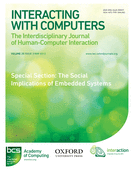
INTERACTING WITH COMPUTERS
Unveiling the Dynamics of Digital EngagementINTERACTING WITH COMPUTERS is a renowned journal published by Oxford University Press, focusing on the interdisciplinary field of Human-Computer Interaction, as well as aspects of Library and Information Sciences and Software. With a rich history of publication since 1989, this journal has established itself as a significant platform for scholars to disseminate cutting-edge research and innovative methodologies that enhance our understanding of how humans engage with technology. Despite being classified in the Q3 and Q2 quartiles across various categories, its 2023 Scopus rankings highlight its relevance, positioning it within the 69th percentile for Library and Information Sciences. This makes it an essential resource for researchers, professionals, and students looking to stay informed about the latest advancements and discussions in this rapidly evolving domain. Though not currently open access, INTERACTING WITH COMPUTERS offers substantial insights that are crucial for driving forward the conversation in Human-Computer Interaction, ensuring its relevance in both academic and applied contexts.

ACM Transactions on Human-Robot Interaction
Exploring Innovative Interactions Between Humans and Machines.ACM Transactions on Human-Robot Interaction, published by the Association for Computing Machinery, is a premier journal dedicated to advancing the field of human-robot interaction, a critical area within artificial intelligence and human-computer interaction. With a high impact factor and esteemed rankings, including Q1 in both Artificial Intelligence and Human-Computer Interaction, this journal serves as a vital platform for researchers, practitioners, and students aiming to explore innovative designs, methodologies, and applications that enhance the integration of robots in our daily lives. Covering research from 2018 to 2024, the journal encourages submissions that push the boundaries of knowledge and technology, contributing to the burgeoning dialogue on how robotics can be effectively and ethically integrated into human environments. Despite operating under a traditional access model, the journal's scholarly contributions play a crucial role in shaping the future of intelligent systems, making it an invaluable resource for anyone aiming to understand and influence the interaction between humans and machines.
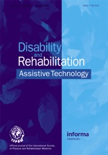
Disability and Rehabilitation-Assistive Technology
Transforming Challenges into Solutions with Assistive InnovationsDisability and Rehabilitation-Assistive Technology, published by Taylor & Francis Inc, is a leading journal dedicated to advancing research in the field of assistive technology, disability, and rehabilitation. With an ISSN of 1748-3107 and an E-ISSN of 1748-3115, this journal serves as a vital resource for researchers, clinicians, and professionals, providing high-quality, peer-reviewed articles that explore the latest innovations and methodologies in assistive technologies aimed at improving the quality of life for individuals with disabilities. The journal is recognized for its significant impact across multiple disciplines, achieving prestigious Q1 rankings in Rehabilitation and Speech and Hearing, and maintaining a solid position in Q2 across other relevant categories such as Biomedical Engineering and Orthopedics. As a collaborative platform for sharing knowledge and research findings, Disability and Rehabilitation-Assistive Technology plays a critical role in bridging the gap between technical advancements and practical applications in rehabilitation. Researchers and practitioners are encouraged to contribute and engage with the journal to enhance the collective understanding and efficacy of assistive technologies.

GetMobile-Mobile Computing & Communications Review
Innovating Mobile Solutions for TomorrowGetMobile-Mobile Computing & Communications Review, published by the Association for Computing Machinery (ACM), is a leading journal dedicated to the evolving field of mobile computing and communication technologies. With an ISSN of 2375-0529 and an E-ISSN of 2375-0537, this publication serves as a vital resource for researchers, professionals, and students, providing insights into the latest advancements, trends, and challenges in mobile technology. The journal covers a comprehensive range of topics, including but not limited to mobile networks, communications protocols, mobile applications, and edge computing, making it invaluable for those in academia and industry alike. Although specific metrics such as impact factor and H-index are currently unavailable, GetMobile is recognized for fostering innovative research and promoting knowledge exchange in mobile and computational communications. As the field continues to grow, this journal remains pivotal for disseminating impactful studies and practical applications that drive the future of mobile technology.

International Journal of Mobile Human Computer Interaction
Exploring the nexus of human experience and mobile technology.International Journal of Mobile Human Computer Interaction (IJMHCI) is a leading scholarly publication dedicated to advancing the field of human-computer interaction in mobile environments. Established by IGI Global, this journal has served as a vital platform for researchers and professionals since its inception in 2009. With a focus on innovative designs, user experience, and the evolving landscape of mobile technology, IJMHCI plays a critical role in bridging theoretical research and practical applications. Though currently categorized in Q4 within the Human-Computer Interaction category for 2023, its consistent publication across the years reflects a commitment to fostering insightful discussions among academia and industry practitioners alike. The journal is indexed in Scopus, ranking #78 out of 145 in its field, highlighting its growing influence. While it does not currently offer open access options, its valuable contributions to mobile HCI research make it an essential resource for students and established researchers striving to explore the complexities of human interaction with mobile technologies.

Multimodal Technologies and Interaction
Pioneering Research in Multimodal Technologies.Multimodal Technologies and Interaction, published by MDPI since 2017, is an esteemed open-access journal based in Switzerland, dedicated to the exploration and advancement of innovative multimodal systems that enhance user experience across various digital platforms. With its commitment to disseminating high-quality research in diverse areas such as Computer Networks and Communications, Human-Computer Interaction, and Neuroscience, the journal has rapidly established itself within the academic community, achieving a commendable position in Scopus rankings including Q2 in both Computer Networks and Communications and Computer Science Applications. As an essential resource for researchers, professionals, and students alike, Multimodal Technologies and Interaction fosters interdisciplinary dialogue and supports the development of cutting-edge technologies, ensuring that advancements in multimodal interaction are accessible to a global audience. Scholars can benefit from its Open Access format, allowing unrestricted access to influential studies that shape the future of technology and interaction design.

Journal of Postsecondary Education and Disability
Fostering Innovation in Disability Studies.The Journal of Postsecondary Education and Disability (ISSN: 2379-7762; E-ISSN: 2328-3343), published by the Association on Higher Education and Disability (AHEAD), stands as an essential resource for researchers, professionals, and students dedicated to the study and enhancement of postsecondary education for individuals with disabilities. This esteemed journal aims to foster a deeper understanding of accessibility issues, inclusive practices, and policy development within higher education contexts, thereby facilitating academic discourse and innovative solutions. With its commitment to advancing knowledge and promoting best practices, the journal serves as a pivotal platform for sharing empirical research, theoretical discussions, and case studies that address the multifaceted challenges faced by students with disabilities. By providing high-quality content that bridges research and practice, the Journal of Postsecondary Education and Disability plays a critical role in shaping inclusive educational environments and empowering diverse student populations.
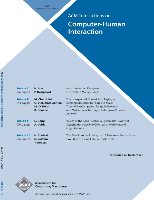
ACM Transactions on Computer-Human Interaction
Bridging the Gap Between Users and TechnologyACM Transactions on Computer-Human Interaction (ISSN: 1073-0516; E-ISSN: 1557-7325) is a prestigious journal published by the Association for Computing Machinery, focusing on the dynamic and rapidly evolving field of Human-Computer Interaction (HCI). With an impressive 2023 impact factor reflecting its high-quality research output, it proudly holds a Q1 ranking in the HCI category on Scopus, positioning it among the top journals in the field. Established in 1994, the journal has been a vital resource for researchers and professionals alike, featuring innovative studies that explore the design, evaluation, and implementation of user interfaces and interactive systems. Its broad scope encompasses various aspects of HCI, including cognitive processes, user experience design, and the social implications of technology. As an essential read for anyone involved in HCI research and practice, the journal is a gateway to advancements that shape the future of human-technology interactions. The journal is accessible to readers globally, and it plays a pivotal role in disseminating knowledge that drives excellence in software design and user interface research.
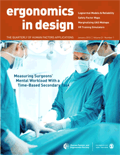
Ergonomics in Design
Empowering designers with cutting-edge ergonomic insights.Ergonomics in Design is a premier journal published by SAGE PUBLICATIONS INC that focuses on the intersection of engineering and human factors, offering essential insights into the practical applications of ergonomics. With an ISSN of 1064-8046 and E-ISSN of 2169-5083, this journal aims to disseminate high-quality research and innovative design solutions that enhance user experience across various domains. Having consistently ranked in the Q2 tier for Engineering and Q3 for Human Factors and Ergonomics, as per the recent Scopus Ranks, it serves as a valuable platform for scholars and practitioners dedicated to the advancement of ergonomic principles in design. The journal encompasses a wide array of topics from product design to workplace ergonomics, facilitating a multidisciplinary dialogue that supports the improvement of safety, comfort, and performance. This commitment to bridging theory and practice has established Ergonomics in Design as a vital resource for those keen to influence the design landscape from 1993 through to 2024 and beyond.